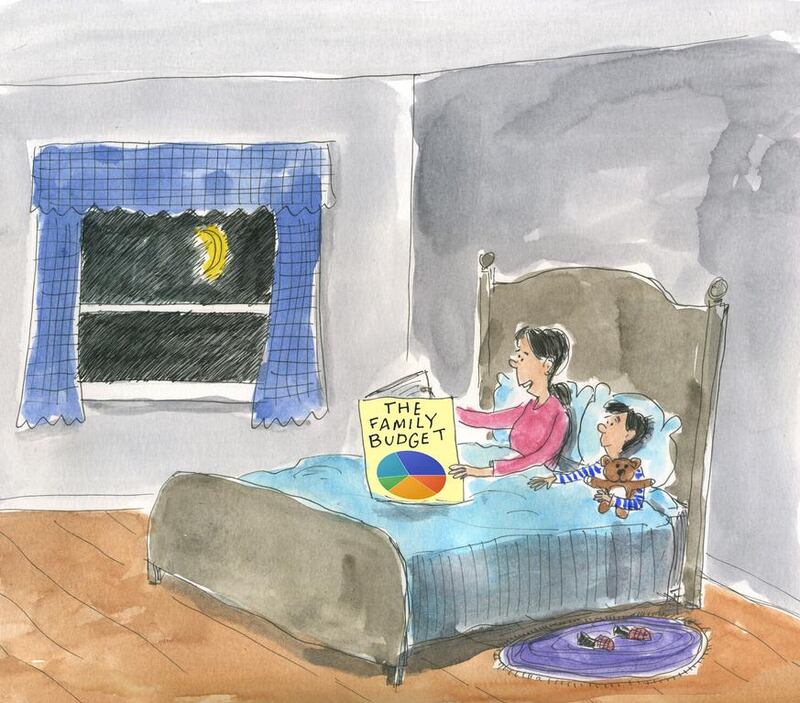I was cornered. There was no wiggle room. My eldest son caught me off guard with a very direct question. About the facts of life. The fiscal facts, that is.
He asked: "How much money do we have? Exactly how much money is there in your accounts?"
And so it came to pass that, instead of tucking my nine-year-old in with a kiss, we ended up discussing and disseminating the fiscal facts of our life.
He even created an impromptu scale. It goes like this:
1. You are vvvvvv poor
2. You have Dh500 in total
3. You can buy food and clothes, but you can't do daily things that you'd like
4. You worry about being able to pay your bills
5. You don't worry but you don't have anything left after you've paid
6. You have a bit left over that you can save up
The scale quickly leaps into millionaire status and builds up to a crescendo of untold wealth, glitz and glamour at 10.
I suppose it was just a matter of time. He's already done the "why is that man begging for money?" on our travels, and "are we rich?" questions.
He asks whether certain homes he sees qualify as mansions - a word he heard from a peer describing his family's newly acquired property abroad.
My son has declared repeatedly that he is not interested in buying fast cars and expensive things. Who knows what his future choices will be? My wish is for him to be money-savvy and value-aware. By this I do not mean simply cost-aware. But more than that, I want him to know why we live the way we live. Why we have a certain car or brand of clothes.
One way of doing this is to talk openly about money, spend, cost. Which I do. But I missed the basic and all-important issue of: where do we fit, on the financial scale, and what is the value of our life?
That night I assured him that we were not living hand to mouth - thus beating the majority of mankind.
I explained that we are somewhere between No 5 and 6: not worrying about paying our way - able to save up for ad hoc spending, which, when we pay out, can set us back to No 5 - depending on what the purchase is, how much it costs, and how it fits into our overall life.
The last thing I want is for my son to worry about money. I know a young man who, as a very young boy, was pretty much a latchkey kid for a chunk of time. He'd be dropped off from school, let himself in and wait for his mother to come back from work. She was a single parent and broke, and did what she thought best to keep things afloat. Thankfully her being a teacher meant he did not have to wait for hours.
This boy is now an adult. He earns well, but frets endlessly about finances. It's as though his childhood experience - he probably knew why he had to wait for his mum, and that she worried about bringing in money - lives on, resulting in the little boy within still on the look out for money - or mum - or both.
I have read copious research and opinion about when and how to talk with children about money. To summarise: use age-appropriate, non-fearmongering ways. Make it relevant to and resonate with them. Make them accountable for saving and their spending decisions. And not holding off till they are "older".
The issue of pocket money is emotive, and I'll be sharing my thoughts another time.
My children and I often talk about the meaning of wealth, what money is for and people's choices when it comes to spending. For example, people having expensive things does not mean they are rich - they could be in debt as a result.
What I do not talk about is money in absolute terms of: how much do I earn. What I am worth. No. Not yet at least.
One reason is that a figure given in isolation doesn't mean much. But income versus outgoings, now that's something I'll be looking to share at some point.
And so to start on that road, I have created a notebook emblazoned with: the bank of mummy.
Most evenings I ask what we did that day and how much we spent.
I write it down in columns with simple titles such as: daily spending (food, petrol and the like); other (such as insurance, vet and tyre - we ended the year with a puncture) plus "fun".
I share what we spent in each category and in total.
It's not just a way of familiarising him - his younger brother is not interested at this stage - with our family spending, but it will serve as a benchmark against which I can, in the future, share what my daily takings are and how much we end up keeping over the course of a month and a year.
This book also serves to show - in figures - why I work. One way for us to spend more time together is to spend less - ergo I work less. Or if we have a family target, like a fantastic holiday that we save up for, we can spend less and perhaps I work more.
The point is that it is a real money conversation about family life. Note the word "real".
The bottom line is that children need financial acumen for their future well-being. I would say their current well-being too: when a child pipes up about how much their new family car costs or similar, how great would it be if your child could hold their own with the understanding that your family makes specific financial choices, and how they affect your son or daughter? It could be that you are saving up for something special, or that you are spending more time with them instead of money on them.
Back to being cornered with a fiscal facts of life chat - I'm grateful my son did that. It was a shock. But it made me realise that it's no good knowing things and keeping them to myself. Or talking about important ideas like wealth, value and money without bringing in real examples from our family life. My children need to know too - in an age-appropriate manner - so that they can be fiscally familiar and fit for a great life.
Nima Abu Wardeh describes herself using three words: Person. Parent. Pupil. Each day she works out which one gets priority, sharing her journey on finding-nima.com
pf@thenational.ae
Follow us on Twitter @TheNationalPF
Explaining fiscal birds and bees to children
Sharing the fiscal facts of life with her nine-year-old son was an eye-opening experience for Nima Abu Wardeh.

Editor's picks
More from the national




